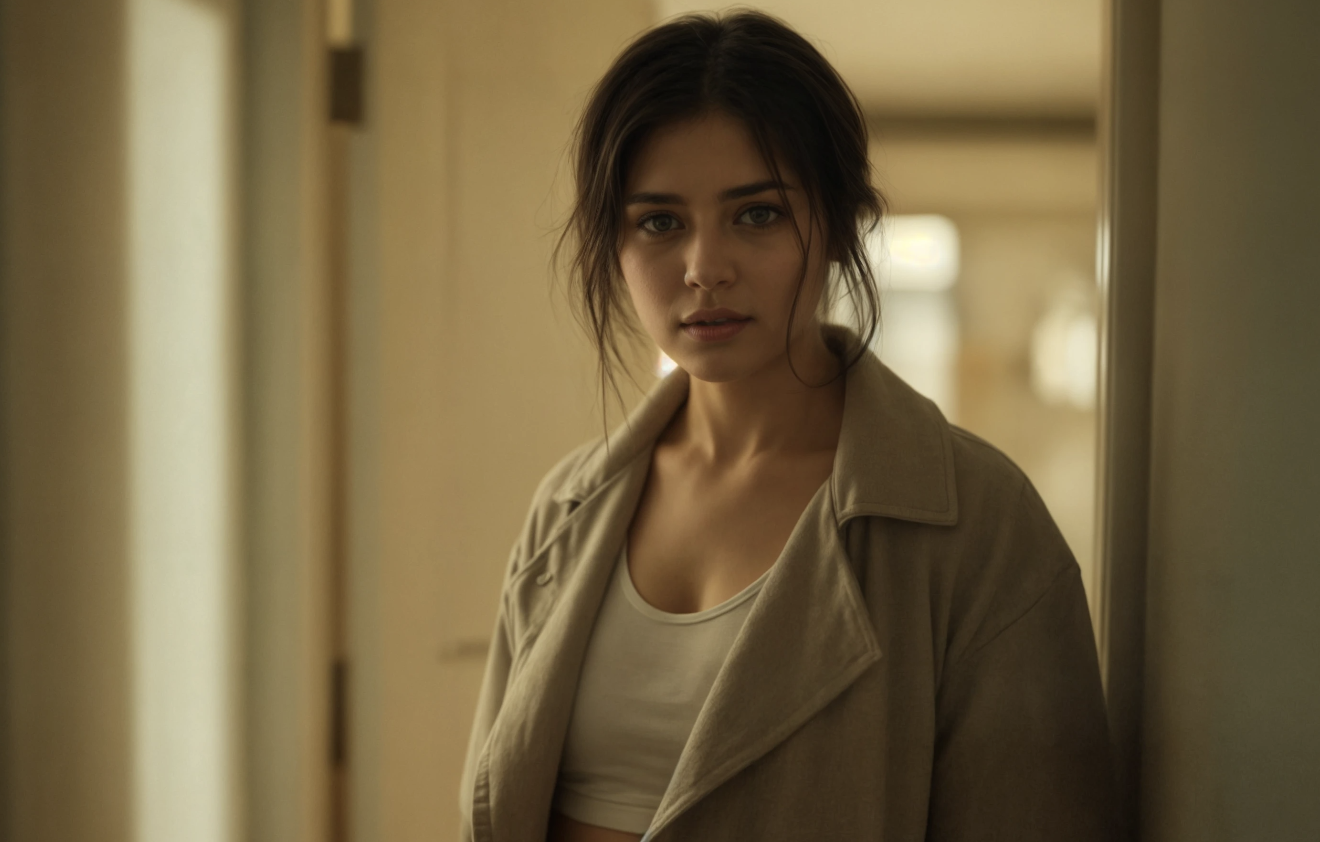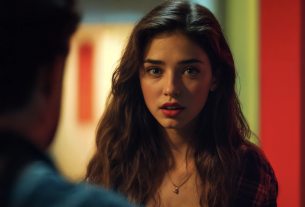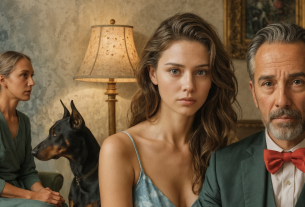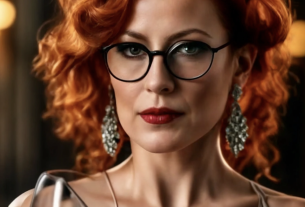The taxi smelled of gasoline and a tiredness not its own, soaked into the seats. The driver glanced a couple of times in the rearview mirror at Katya and at the white envelope in her hands, but kept quiet. Wise guy, or just indifferent.
Katya watched the city lights flicker by, smeared into dirty streaks on the window. She wasn’t crying. Inside everything had simply become very light and cold, like an empty glass vessel that had been poured out.
Little Nikita, her son, slept in the infant car seat she had barely managed to wedge into the back. His quiet snuffling was the only real thing left in her collapsed world.
Right up to the end she kept running a different scenario in her head. She’d open the door and there would be Vadim. Flustered, guilty, with some ridiculous explanation about traffic, a dead phone, or a biblical flood. She wouldn’t even listen—just nod and go into the nursery. The main thing was that he was there.
But her husband hadn’t met her after the delivery. Not at the maternity hospital steps with silly balloons, not now at the entrance to their—apparently now only her—building.
The driver helped her lift out the heavy car seat.
“Congratulations on the new addition,” he muttered, awkwardly shifting from foot to foot.
Katya nodded silently and handed him the money.
The ride up in the elevator felt like an eternity. The walls, scribbled over by teens, pressed in from all sides. Each floor—like a new circle of her personal hell.
The key turned stiffly in the lock, as if reluctantly, as if the apartment itself resisted her returning alone.
Inside it was dark and echoing. No smell of dinner, no sliver of light under the bedroom door. Only the sharp, barely-there trace of his cologne, the one he always used before going out “on business.”
On the hall table lay a sheet of paper folded in half. Not an envelope, not a card. Just a page torn from an expensive planner.
She read it, and the words didn’t sink in at once; they clung to the edges of her thoughts, refusing to fall to the bottom.
“Kat, I can’t. I tried, honestly. But this isn’t for me. A child, the routine, all that responsibility… I want to live, to travel, to breathe. I’m leaving everything to you—the apartment, the car. Just don’t look for me. This will be better for everyone.”
She read the note again. And again. She searched the even, almost calligraphic letters for a drop of doubt, pain, regret. There was none. Only a cold, selfish statement of fact. He had simply written himself out of their life like out of a boring novel.
Katya didn’t scream. She carefully set the car seat on the floor, took off her jacket, and hung it on the rack. Mechanical, as if watching herself from the outside.
She went into the nursery. The room they had arranged with such love. Light-blue walls, a crib with a mobile of felt stars, a changing table. Everything was perfect. Sterile. And dead.
Nikita grunted a little in his sleep and stirred, pulling her back to reality.
Katya went to the window and looked down at the night city. The lights no longer blurred. They had become sharp, clear, prickly.
She was alone. Absolutely alone with a tiny human in her arms in a huge, alien city. And the only thought beating in her head was:
“Mom… I need to call Mom.”
The phone was picked up almost immediately, as if they’d been waiting.
“Katya? Well, did you get there? How’s the grandson?”
Her mother’s voice, Valentina Petrovna’s, was even and businesslike. Not a hint of suspicion in it.
“Mom…” Katya swallowed the viscous saliva. “Vadim left.”
Silence hung on the other end. Not surprised, not frightened. A heavy, all-understanding silence of someone who has lived life and knows it can be like this.
“Pack your things. Only the essentials for you and the baby.”
No questions—“how,” “why,” “what happened.” Just a clear, brief instruction.
“Where to?” burst out of Katya. A stupid question.
“Home, where else. Your father will set out in the morning to get you. Give him the address.”
Katya dictated the address that her father, Sergei Ivanovich, knew perfectly well anyway. They had visited her parents with Vadim last New Year’s. Back then everything still seemed unshakable.
“Block his cards if you have access,” her mother suddenly said sternly. “Do it right now.”
Katya blinked, confused. She hadn’t even thought about that. About money, about the cards. Her world had shrunk to the note on the table and her sleeping son.
“Got it.”
“Don’t fall apart there. You’re not alone now. You have Nikita. Sleep. Morning is wiser than evening.”
Short beeps sounded in the receiver.
The night passed in a fog. Katya fed Nikita, changed diapers, rocked him in her arms, staring at one spot on the wall. She didn’t unpack, didn’t prepare to leave. She simply existed, obeying instinct.
In the evening an old Niva pulled up by the entrance. Sergei Ivanovich—stern, taciturn, as always—hugged her without a word, glanced into the bundle with his grandson, and began carrying the bags down.
As they were getting into the car, her father looked at Vadim’s shiny sedan parked by the building and asked:
“And what about this one?”
“Mom said to sell it,” Katya answered flatly.
Her father grunted.
“Your mother’s right. Leave me the keys and documents. I’ll handle it when I have time. No need for you to bother with that now.”
They hardly spoke the whole drive. Katya watched as the bright lights of the metropolis gave way to the sparse lamps of small towns, and then sank altogether into the autumn dark. Nikita slept.
The village met them with the smell of smoke from stove pipes and barking dogs. Her parents’ house was old but well kept. Warm light glowed in the windows.
Her mother met them on the porch. She didn’t hug Katya, didn’t pity her, didn’t lament. She simply took the precious snuffling bundle from her hands.
“Come in, your father’s heated the banya. Have dinner and go wash up. I’ve prepared a room for you and Nikita.”
The house smelled of wood and dried herbs. On the table sat a plate of hot potatoes and pickles. Food whose taste Katya felt she had forgotten.
She ate silently, mechanically. Then she sat in the hot, steamy bathhouse and, for the first time in two days, cried. Soundlessly, letting tears fall into the wooden basin. It wasn’t the pain that left. It was the former her. The Katya who believed in “happily ever after.”
The following months blurred into one long, drawn-out, gray day. Feedings by the clock, sleepless nights, walks with the stroller along village roads turned to mush by the rains.
Life narrowed to a simple, almost animal cycle: sleep, food, caring for her son. She hardly looked in the mirror, forgot what music sounded like that wasn’t a lullaby.
A week later her father brought a thick wad of cash. Said he’d sold the car. Got a good price. Katya just nodded and put the money in a dresser drawer without counting. It was money from another, past life.
She hardly spoke with her parents. And they didn’t pry. Her mother took over the household; her father split firewood, carried water, fixed what broke. Their quiet support was far more important than any words.
One day, stepping out onto the porch, she saw their neighbor, Aunt Vera, talking to her mother over the fence. When she spotted Katya, the neighbor fell silent, following her with a long, sympathetic-and-curious look.
That look had everything in it: pity, judgment, and a touch of gloating. Katya realized the whole village already knew her story. The story of a girl who’d gone to the city for a pretty life and came back alone with a baby in her arms.
She didn’t hide. She just nodded to the neighbor and slowly went back inside. Let them look. Let them talk. She didn’t care. She was building a new fortress. Inside herself.
Eight months passed. Nikita learned to sit up and laugh out loud. That laughter became Katya’s tuning fork, setting her to life.
The money from the car and what was left in the accounts was dwindling. She knew it, seeing how her mother, without a word, bought another pack of expensive diapers or jars of baby food.
Dependence on her parents, a lifesaver at first, began to weigh on her. She loved them, was endlessly grateful, but felt infantile, a grown girl perched on their necks again.
In the evening, after Nikita fell asleep and her father watched soccer on TV, Katya sat with her mother in the kitchen. Her mother was sorting buckwheat, and there was an ancient wisdom in that simple act.
“Mom, I need a job.”
Valentina Petrovna didn’t look up.
“What job? Who’ll be with Nikita?”
“I’ll talk to Zoya Vasilievna. Maybe the school will take me. I have a teaching degree. Russian, literature.”
Her mother finally lifted her eyes to her daughter. Her gaze was piercing, with no trace of pity.
“At our school? Think Zoya will take you? No experience, a nursing baby. And the village will wag their tongues to no end.”
“Let them,” Katya’s voice was unexpectedly firm. “They have their life, I have mine. I can’t sit on your neck forever. Self-pity is an unaffordable luxury.”
The next day, leaving Nikita with her mother, Katya went to the school. An old two-story building smelling of paint and chalk. The smell of her own childhood.
The principal, Zoya Vasilievna, a stout woman with tired but intelligent eyes, listened in silence, tapping a pen on the desk.
“You’ve got a good diploma, with honors, I remember. But zero experience. And the baby is small. You’ll be out on sick leave all the time.”
“I won’t,” Katya cut her off. “My mom will help. I really need this job, Zoya Vasilievna.”
The principal sighed.
“I only have one opening. Lyudmila Sergeevna is going on maternity leave. But it’s a tough class, seventh grade. Mostly boys, lots from troubled families. They’ll eat you alive, girl.”
“It’s worth a try.”
Zoya Vasilievna looked at her for a long, appraising moment. She saw not a frightened abandoned woman but someone with a straight back and a stubborn gaze.
“Fine. Start in September. But mind you, I won’t go easy on you.”
Leaving the office, Katya nearly bumped into a tall man in a work jacket in the corridor. He was fixing a loose door in one of the classrooms.
He turned at the sound of her steps. He had fair hair bleached by the sun and very calm gray eyes.
“Careful, the threshold creaks here,” he said simply, without curiosity.
“Thanks, I know,” Katya replied. “I studied here.”
He nodded and went back to work.
Katya walked home and, for the first time in a long while, felt not the weight of the past but a fragile hope for the future. She just knew she’d taken the first step. The hardest one.
September first smelled of chrysanthemums and fresh paint. Katya stood before her seventh graders and felt like a gladiator in an arena. Twenty pairs of eyes looked at her with varying degrees of hostility and curiosity.
They were exactly as the principal had warned. Noisy, cocky, almost-grown boys and a few girls who kept to themselves. The ringleader was Yegor Kovalyov, a lanky kid with an insolent look, sitting at the back.
“Hello. My name is Ekaterina Sergeevna. I’m your new homeroom teacher and your Russian language and literature teacher.”
“So what, the old one ran away?” someone yelled from the back row. The class snickered.
Katya found Yegor with her eyes. He wasn’t laughing; he just watched her, studying her with lazy superiority.
“Lyudmila Sergeevna had a baby girl. She’s got more important things now than teaching you where to put commas,” Katya answered calmly.
The bell cut off the brewing back-and-forth. The first lesson passed in a state of cold war. They didn’t listen, whispered, dropped their textbooks. Katya didn’t raise her voice.
She methodically taught the class, addressing the few who tried to listen. Among them was a quiet girl with huge gray eyes, sitting at the front desk.
Katya remembered her name: Masha Zavyalova. The carpenter’s daughter.
It went on like that for a week. She came home wrung out like a lemon, hugged milk-scented Nikita, and remembered what she was doing it for. Every day at school was a small battle she had no right to lose.
The breakthrough came unexpectedly. They were studying “Taras Bulba.” The class was openly bored.
“This is all crap,” Yegor declared loudly. “About some old geezers with sabers.”
“What isn’t crap, Yegor?” Katya asked, walking up to his desk.
“Video games! That’s where the action is, real battles!”
Katya perched on the edge of the chair next to him. The class froze.
“Fine. Let’s imagine Ostap and Andriy are two players on the same team. They have a common goal, a shared mission. But at some point one of them betrays the whole team for a girl on the enemy side. What do they do with those in games?”
Yegor frowned, thinking.
“Well… they kick him from the clan. Ban him. Call him a traitor.”
“Exactly. Gogol basically wrote about the same thing. About betrayal. About the choice between duty and love. And about what happens when your best friend—your brother—ends up on the other side. Do you have a best friend, Yegor?”
The boy said nothing, just looked away. But Katya could see she’d hit the mark. For the first time, she’d dented his armor.
After classes, as she was leaving the school, Oleg Zavyalov caught up with her. He’d come for his daughter.
“Ekaterina Sergeevna.”
“Hello, Oleg,” she answered.
“Just Oleg,” he smiled. The smile transformed his stern face. “Masha says you put Kovalyov in his place today. That’s almost impossible.”
“I just talked to him,” Katya shrugged.
“Not many people talk to him. His father drinks, his mother works in the city. He’s on his own. Thank you.”
They stood a moment in silence.
“You’ve got chalk on your sleeve,” he said suddenly.
Katya looked at her sleeve and awkwardly tried to brush it off. Oleg stepped closer and lightly, barely touching, flicked away the white mark. His fingers were warm and rough.
Their acquaintance began with little things like that. He’d tighten a wobbly desk in her classroom; she’d send him a book through Masha when she learned he liked science fiction.
One winter, in a heavy snowfall, her car got stuck at the village exit. It was Oleg, in his old UAZ, who pulled her out, then spent half the night helping her father clear the yard.
They hardly spoke about personal matters. But in his calm presence, in his readiness to help without extra words, there was more support than in hundreds of empty phrases.
Two years passed. Nikita was already going to the village kindergarten. The seventh graders were now ninth graders, and Yegor Kovalyov, strangely enough, was preparing to take the literature exam.
One summer evening they sat on a bench by the river. Nikita and Masha were floating little bark boats.
“Katya,” Oleg said, looking at the water. “My house is big. For just Masha and me it’s too spacious. And I think Nikita would like his own room.”
It wasn’t a flowery declaration of love. It was something bigger. An offer to share a life. Not passion, but a quiet, deep certainty.
Katya looked at him, at his calm face, at the children laughing by the water, and realized she had long been home already. That her world, once shattered into a thousand pieces, had come together again. And this new picture was stronger, truer, and far more beautiful than the old one.
She didn’t go looking for freedom or travel. She found something more important. Herself.
Another five years passed.
A Saturday noon at the Zavyalovs’ smelled of freshly cut grass and meat roasting in the oven. Seven-year-old Nikita, the spitting image of Katya, was solemnly fixing his bike with Oleg in the yard.
Masha, already sixteen, sat on the veranda with a book, but kept glancing toward the gate. She had her first date today and was nervous.
Katya watched them from the kitchen window, stirring a sauce, and felt the absolute fullness of the moment.
Her life was here, in these simple sounds and smells. In her son’s laughter, in her husband’s focused snuffling, in the soft rustle of pages as Masha turned them.
She had long since sold that city apartment, investing the money in a large plot next to the house. A young orchard grew there now, which they had planted together.
Unexpectedly, an unfamiliar expensive car stopped at the gate. A man got out. Well dressed, fashionable glasses on his face, but somehow crumpled, tired. Too city for their village.
Katya recognized him at once. Vadim.
Her heart didn’t skip, didn’t beat faster. She felt only mild surprise, as if she’d seen a character from a long-forgotten film.
Oleg lifted his head from the bike and stood up silently, wiping his hands on a rag. Nikita looked at the stranger with curiosity.
Vadim came up to the gate but didn’t dare open it. He looked at Oleg, at the boy; then his gaze found Katya in the window. There was something like shock in his eyes.
He had apparently imagined a different picture. A tear-streaked, aged, unhappy woman in a shabby robe. Not this calm, self-possessed woman in a simple summer dress, standing on the threshold of her big, solid home.
Katya stepped out onto the porch.
“Hello, Vadim.”
“Katya… I… I’ve been looking for you.”
“What for?” Her voice was even, without a shade of emotion.
“I wanted to see… my son.”
Nikita stopped fussing with the bike and came over to Oleg, pressing against his leg. He didn’t know this man. Oleg was his dad.
“He doesn’t know you, Vadim.”
“But I’m his father!” Desperation broke through in his voice. “I’ve been a lot of places, Katya, seen everything. But it’s all… dust. I realized I left the most important thing here.”
Katya looked at him without anger and without pity.
“You didn’t leave it. You threw it away. There’s a difference. The freedom you chased turned out to be just emptiness, didn’t it?”
Vadim was silent, gripping the handle of his expensive bag. His world of travels and adventures collapsed into this awkward scene at a stranger’s gate.
“You have five minutes,” Katya said. “You can talk to him. Here. At the gate. Oleg, let’s go in the house. Nikita, come here.”
She didn’t humiliate Vadim, didn’t try to prove anything. She simply showed him his place. The place of an outsider who was politely given a few minutes.
The conversation didn’t take. Nikita answered in monosyllables, hiding behind his mother. To him this handsome man was nobody. After three minutes, Vadim gave up.
“He… he doesn’t look like me at all,” he said to Katya, bewildered.
“Of course not. He looks like someone who knows what a home is.”
Vadim looked at her calm face, at the solid man behind her, at the two children who were her family.
And for the first time, real, sharp understanding appeared in his eyes—not regret for what he’d done, but what he had lost. Not a woman with a child. An entire life he had traded for a glossy postcard.
He turned and walked to his car. Without looking back.
Katya watched him go and returned to the house, where the table was already being set. She hugged Oleg and ruffled Nikita’s hair.
Her world was here. And there was no place in it for ghosts from the past



